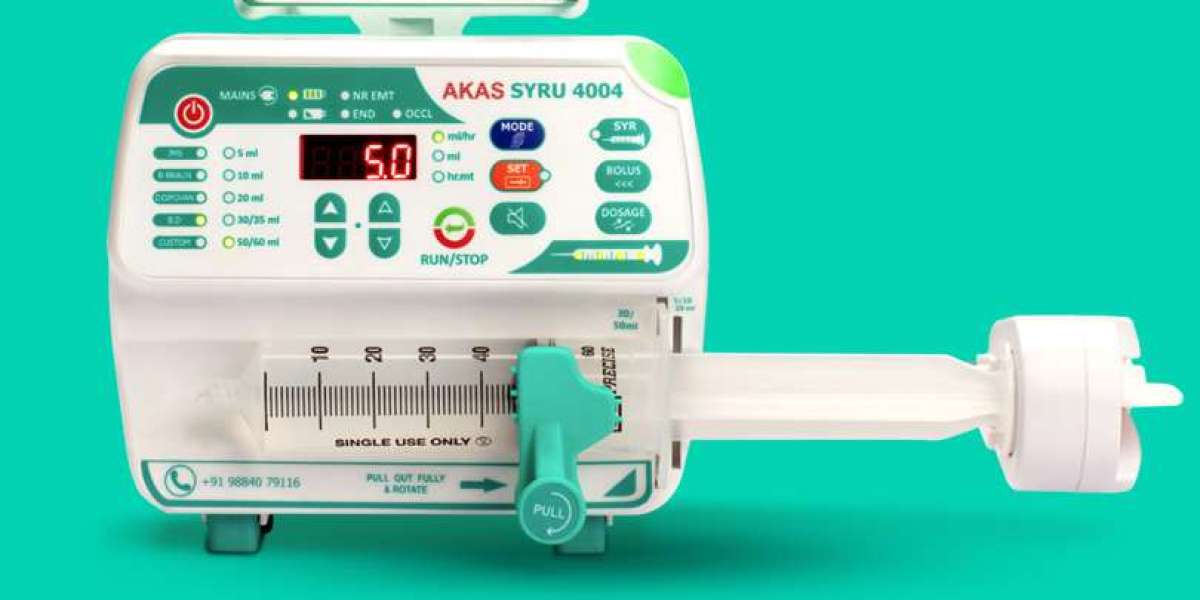Introduction
- In today’s healthcare landscape, precision and consistency are essential to patient safety.
- Hospitals rely on advanced drug delivery technologies to ensure controlled medication administration.
- Among the most trusted tools in critical care is the syringe pump, a quiet yet vital device in modern hospital care.
- Designed to deliver small volumes of fluid with exceptional accuracy, syringe pumps are integral to ICU, NICU, oncology, and surgery.
- Their role is to support medical professionals in administering life-saving medication with speed, control, and safety.
- As hospital demand grows, reliable syringe infusion pump suppliers have become crucial partners in maintaining clinical standards.
Understanding the Syringe Pump
- A syringe pump is a medical device that delivers precise amounts of fluid via a syringe over a set period.
- It provides continuous, controlled medication flow—ideal for high-risk or time-sensitive treatments.
- These pumps are widely used in paediatrics, anaesthesia, and oncology, where accurate dosing is critical.
- The device operates by mechanically pushing the plunger of the syringe forward at a pre-set rate.
- This method ensures that the drug enters the bloodstream or targeted area gradually and safely.
- With programmable features, alarms, and dose calculators, syringe pumps have become an indispensable clinical ally.
Why Syringe Pumps Are Vital in Modern Hospitals
- The demands of modern hospital care have grown more complex with advancing treatments.
- Medical teams must balance effectiveness with safety across departments and patient types.
- Syringe pumps provide the confidence and control needed for accurate, low-volume infusions.
Key Benefits of Syringe Pumps in Hospital Settings:
- Precise Drug Delivery:
Ensures accurate, micro-level dosages, critical in neonatal or oncology care. - Programmable Infusion Rates:
Allows clinicians to tailor drug delivery according to patient condition and therapy needs. - Alarm Systems for Safety:
Immediate alerts for occlusion, empty syringe, or system malfunctions help prevent complications. - Compact and Portable:
Suitable for bedside, ambulance, or intra-hospital transfer use. - Minimal Fluid Waste:
Ideal for expensive or limited-availability medications. - Support for Complex Therapies:
Enables multi-phase drug infusion, particularly helpful in anaesthesia or cardiac care.
Role of Syringe Infusion Pump Suppliers in Patient Care
- Behind every high-functioning hospital syringe pump lies a reliable and dedicated supplier.
- Syringe infusion pump suppliers are responsible for ensuring that devices meet international quality standards.
- Their role goes beyond manufacturing—they offer training, compliance support, and after-sales service.
- Hospitals must choose suppliers with proven experience in clinical environments and medical technology.
- These partnerships are not only based on products, but also on long-term reliability and response.
- A supplier’s ability to deliver consistent innovation and quality directly affects hospital performance and patient safety.
How to Identify the Right Syringe Infusion Pump Suppliers
- When sourcing syringe pumps, hospitals need assurance in both product and provider.
- The right supplier should offer not just functionality but also dependability, certification, and clinical support.
- A thorough evaluation of syringe infusion pump suppliers helps ensure the best outcome for patient care.
Key Qualities to Look for in Trusted Suppliers:
- ISO and CE Certified Manufacturing Facilities
Guarantees compliance with international health and safety regulations. - Proven Clinical Integration
Devices should already be in use in reputable hospital environments. - Responsive After-Sales Service
Quick troubleshooting, servicing, and user training are vital. - Technology Support and Updates
Continuous improvement and software updates enhance safety and usability. - Customisation and Scalability Options
Ability to meet the specific needs of large hospital networks or specialised departments. - Transparent Documentation and Testing Protocols
A clear record of quality assurance, test results, and device tracking.
Ensuring Safe Infusion with Advanced Syringe Pump Design
- Today’s syringe pumps are more than just devices—they are intelligent systems.
- Advanced models feature wireless integration, data logging, and user authentication.
- These capabilities not only streamline workflows but also reduce the risk of human error.
- Hospitals can integrate syringe pumps with central monitoring systems, ensuring real-time visibility.
- Features such as drug libraries and dosing safeguards prevent incorrect programming or use.
- As healthcare evolves, the syringe pump remains a fundamental tool in ensuring safety at the point of care.
Conclusion
- Syringe pumps play a crucial role in delivering accurate, safe, and steady medication to patients across all hospital departments.
- Their value is enhanced when sourced from experienced syringe infusion pump suppliers who uphold quality, service, and innovation.
- For hospitals aiming to improve infusion safety and efficiency, partnering with the right manufacturer is essential.
- Akas Infusion stands out as a manufacturer of world-class drug delivery devices, including syringe pumps and volumetric pumps.
- With a commitment to precision, safety, and support, Akasinfusion helps hospitals across the globe maintain the highest standards of care.
- Choosing partners like Akasinfusion ensures reliable technology that empowers medical teams and protects patient well-being.



